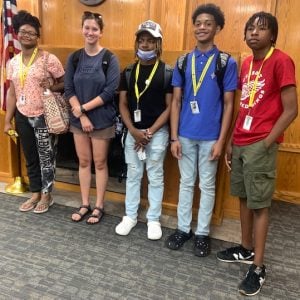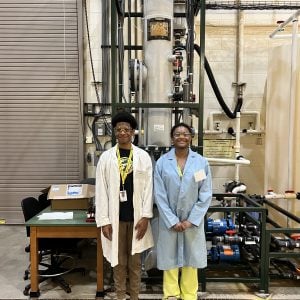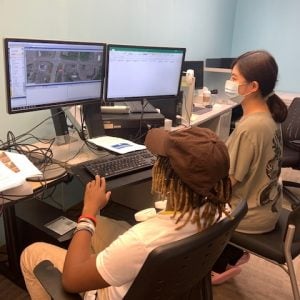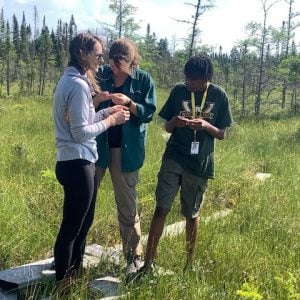Five high school students from Detroit and Houghton participated in a 5-day science and engineering summer internship program at Michigan Technological University (MTU) from July 18-22, 2022. The students were paired with faculty with a variety of expertise and research interests.
Students worked in the lab and/or in the field (outside), toured campus, lived in a dorm, ate in the dining hall, and met students from around Michigan and beyond.
Dr. Daisuke Minikata, Department of Civil, Environmental, and Geospatial Engineering, hosted two interns in his lab that were supervised by graduate students, Rose Daily, Benjamin Cerda Barrios, and Ben Morhardt. High school students, Michelle Simpkins and Eural Johnson learned about PFAS contamination by sampling local bodies of water and using the Orbitrap for qualitative identification, built PFAS molecules in ChemDraw 3D, toured the wastewater treatment plant and MTU Sustainability Demonstration House, became familiar with careers in environmental engineering. Michelle attends UPrep Academy for Math & Science and Eural Johnson attends Cass Tech.
Dr. Kuilin Zhang, Department of Civil, Environmental, and Geospatial Engineering, hosted high school student Omaree Ishmael. Omaree used a Traffic Counter App to collect traffic data at Sharon Avenue and M-26 intersection. He then used the data to create a signalized intersection model using PTV VISSIM, a multi-modal traffic flow simulation software package. He also performed the CAV (Connected and Automated Vehicles) cooperative driving automation simulation.
Lastly, Dr. Evan Kane at the USDA and post-doc Julia Stuart, hosted two interns—Nora Sullivan and Bryson Taylor. Nora attends Houghton High School and Bryson attends Davis Aerospace Academy in Detroit. They learned how to conduct an N2 fixation in the field, performed a glucose assay in the lab, and visited the Nastoria bog field research site.
On the last day of their internship, students summarized the skills and knowledge that they had gained throughout the week in a presentation to fellow interns, hosts, and to their parents who joined virtually.
Students received a $900 scholarship to cover their meals, lodging, and roundtrip transportation on a Michigan Tech coach bus. In addition, the students went mountain biking at Tech Trails which was a brand new experience for four of the five interns. Some experienced being in a forest for the first time.
Students had this to say about their internship experience:
“I learned how wastewater will change how the water is used in the world.“
“Our visit to the bog was very interesting.“
“Learning and experiencing new things!“
“Faculty and graduate students were always willing to answer my questions.”
One student’s comment wraps it up, “Everything was great!”
Three of the five say they are now more seriously considering Michigan Tech after their internship experience.
The high school STEM internship program is coordinated by Michigan Tech Center for Science & Environmental Outreach, with funding from the National Science Foundation, Department of Civil, Environmental, and Geospatial Engineering, USDA Forest Research Lab, Raytheon, and the Shannon Foundation.



